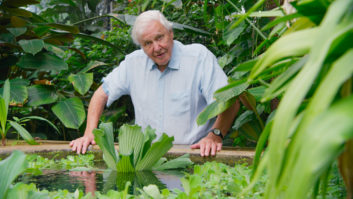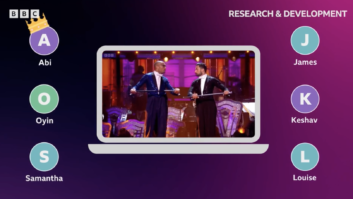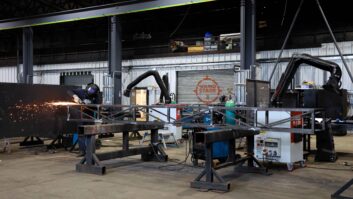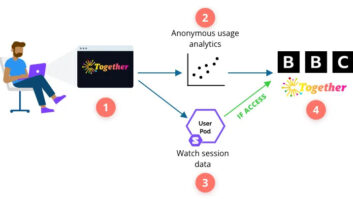Known throughout the industry for some time, but only officially confirmed last week, is the news that Grass Valley’s Infinity camcorder is to join Panasonic’s P2 camera in the BBC’s Starwinder project; BBC Technology Group’s project to move to tapeless HD production by 2010, writes Andy Stout.
What was much less known but crept out in conversations with Grass Valley staff on their stand at London’s Broadcast LIVE show, was that the camcorder faces yet further delays. Pre-production models are not expected now until August, with first shipments to the many organisations that have already placed orders due around the time of IBC. Given that the BBC has been using P2 cameras as far back as the Winter Olympics in Turin, this gives the Panasonic format a certain momentum within the Corporation that must have GV execs slightly concerned.
Three P2s were tested at the Olympics, with the team using them also taking over 80% of their archive out to Italy on drives. While fundamentally happy with the way the units performed, card management was an issue; the cost of the cards meaning that material has to be archived and the cards recycled back out to the camera fairly remorselessly. Charlie Cope, lead editor, BBC Resources who was on the trial also identifies a variety of integration and cross platform issues as well as a slightly tardy speed of data transfer, but says that as it was the first time the cameras had been thrashed in the field, such minor workflow issues were inevitable. “Fundamentally it was a pretty good first hit,” he says. “I was pleased that it went as well as it did.”
The BBC has a number of P2 units currently working out at the World Cup.
Back on message with Grass Valley, meanwhile, Marc Valentin, president of the Grass Valley business within Thomson, said: “We designed Infinity as a completely new approach to ENG and EFP acquisition, one which gave all the choices back to the user. In a single unit – and even on a single shoot – it supports the transition to HD, and allows the user to select not just the compression scheme but the recording medium itself to match the requirements of each individual task.
He added, “It fits into today’s workflow, and helps the broadcaster develop the ideal workflow for the future. We are delighted to be working with the BBC, one of the world’s leading media organizations, on their transition into the tapeless future.”
His comment about the future is interesting, the BBC’s Head of Technology Production, Paul Cheesbrough, having previously commented that MPEG-4 is a future key format for the Corporation in acquisition as well as distribution, and being able to modify a board within a camera to deal with that rather than replace the whole thing is a valuable draw.
And just in case you’ve missed all the buzz about Infinity, here’s a quick overview. Rather than being tied to any proprietary video recording medium, the Infinity camcorder offers a range of recording systems based on commodity IT technology. The REV PRO disk is based on the Iomega REV 35GB removable hard disk system, and is built into every Infinity camcorder, as are slots for professional-grade CompactFlash cards. The use of standard CompactFlash cards gives all the benefits of solid-state recording at off-the-shelf media prices. Infinity also carries USB and Firewire (IEEE 1394) interfaces for connection to other external recording devices, and gigabit ethernet network ports for direct connection of the camera to a networked storage system.







